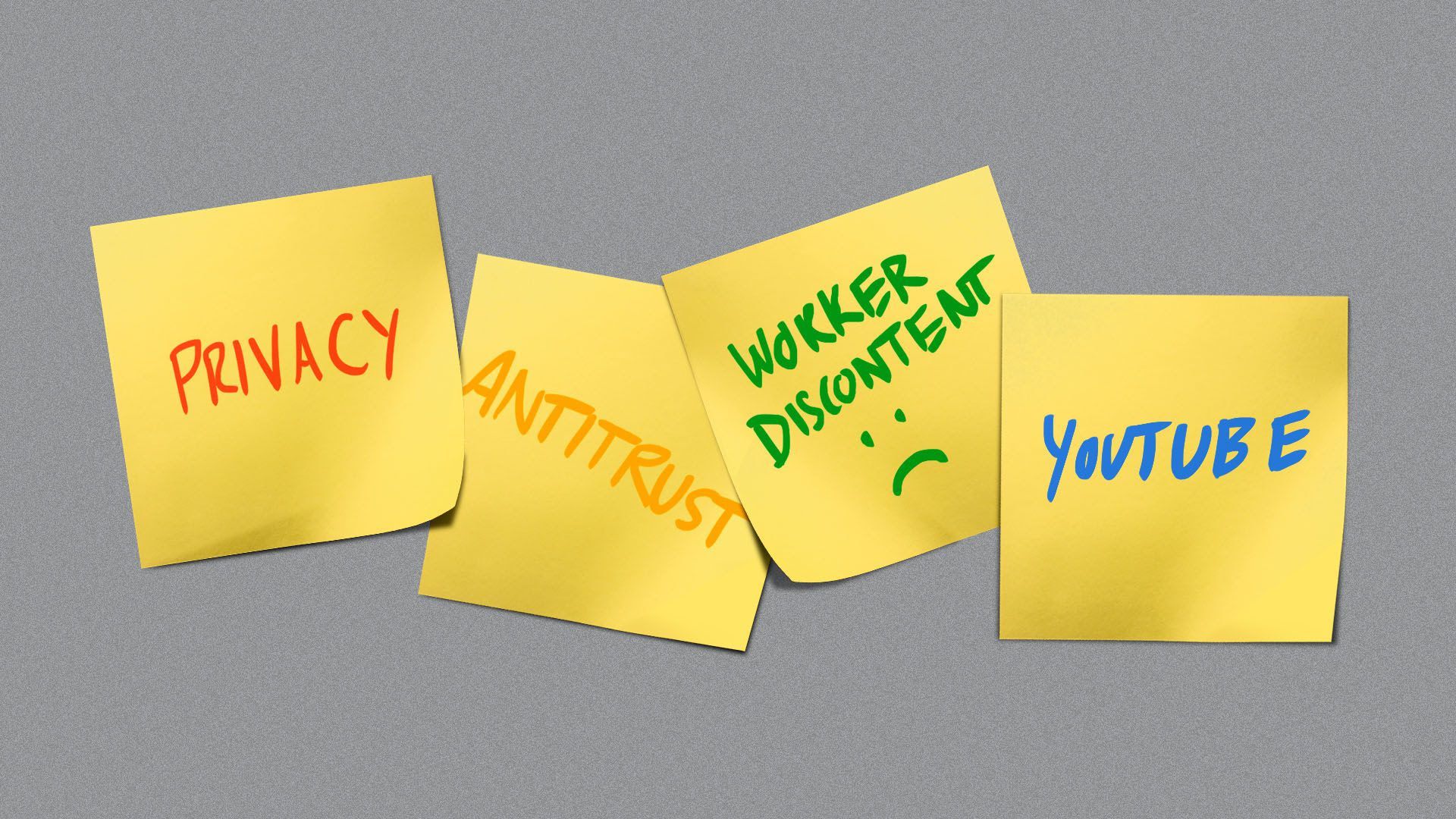Sundar Pichai's Alphabet to-do list
Add Axios as your preferred source to
see more of our stories on Google.

Illustration: Sarah Grillo/Axios
When he was recently named CEO of Google's parent company Alphabet, Sundar Pichai inherited a long list of issues in need of tackling — everything from addressing privacy and antitrust concerns, to managing an increasingly vocal workforce, to ensuring the future of the company's products.
The big picture: As Google CEO, Pichai was already responsible for much of this portfolio. Now, the buck truly stops with him.
Here's what Pichai's to-do list now looks like:
1. Balance privacy against Google's thirst for data. Privacy is an industrywide concern, but the challenge is especially large for a company that prides itself on collecting all the world's information.
- Historically, that has meant the company gathers a lot of personal by following users as they journey across the internet.
- This year, Google began touting privacy as a feature, with Pichai noting that in many cases Google actually has more information than it needs to serve up ads.
- Balancing the quest for more data in a world of artificial intelligence with the growing demand for privacy protections remains a top task for Pichai.
2. Dodge the antitrust barrage. For a company that dominates the global search business, Google has been able to largely contain the impact of antitrust concerns for most of its history, despite a number of probes around the globe. A reckoning could be coming, however.
- The EU has already ruled against the company a number of times, and fresh investigations are looming in the U.S. at both the state and federal levels.
- When Pichai testifies on Capitol Hill in his new role, at least he will no longer face irritation from lawmakers complaining the company should have sent Larry Page instead.
3. Contain employee dissent without wrecking company culture. Google is dealing with an increasingly vocal workforce eager to have a say on everything from where the company does business, to what businesses it is in, to how workers (and vendors and contractors) are treated.
- The company is straining to reconcile business realities with its long history of encouraging employees to speak out and sharing lots of internal information with them.
- Workers have walked out over how the company has handled sexual harassment complaints and protested the prospect of Google contracts with China and the U.S. military.
- Four recently dismissed employees who say they were fired for organizing work have filed complaints with the National Labor Relations Board.
4. Rehabilitate YouTube's image. Although Susan Wojcicki is CEO of the Google-owned video service, she reports to Pichai, and ultimately, he is responsible for the content moderation challenges that go with being home to billions of hours of video.
- YouTube is under increased scrutiny not just for which videos are allowed on the site and which are banned, but also for which are promoted by the platform's recommendation algorithm, and for the conditions borne by workers who scan for inappropriate content.
5. Defend the search franchise. Google continues to dominate its core business, but the company faces increased challenges.
- As search moves from something you type in a box to a picture you take or a command you speak, competitors like Amazon, Apple and Microsoft may find new ways to win market share from Google.
6. Figure out what to do with "other bets." This is the newest area for Pichai, who now is responsible not only for Google's advertising business, but also for the longer-term plays grouped under the Alphabet umbrella in health, autonomous cars and other "moonshots."
The bottom line: There was a lot on Pichai's plate before, and even more now. He'll now have more autonomy. But ultimately, co-founders Larry Page and Sergey Brin still own a controlling interest in the company, so Pichai still has to keep them happy.
Go deeper: Sundar Pichai defends YouTube practices (Axios on HBO)
